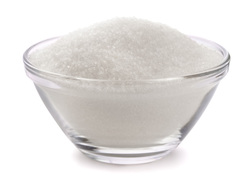 I heard a Pepsi commercial this week on the radio. The marketing hook was Pepsi with “real sugar”. I was afraid of this. With the hype and awareness around high fructose corn syrup, manufacturers are now using sugar (cane sugar/sucrose) again and promoting it as a good thing. HFCS, is a liquid sweetener, easy and less expensive for manufacturers to use in their sweetened beverages and processed foods. It seems we are switching back to sugar in many products. Although I would agree that cane sugar is the lesser evil; added sugar is added sugar and the the real message stays the same…LIMIT YOUR INTAKE OF ALL ADDED SUGARS. For informational purposes only, I wanted to share a description of many sugars on the market today. Some may be better choices than others as some may be a more natural sugar, less processed or contain trace minerals. However, keep in mind that you are not consuming sugar for nutritional value. THESE ARE ADDED SUGARS. Consider the better argument that because some sweeteners are sweeter than others, you might use less of it…and that is a good thing. They also may wreak less havoc on your blood sugar as well. My overarching advice is to limit sugar and know how much you are consuming. Types of Sugar:
Health Inspires.
0 Comments
Leave a Reply. |
Kathryn ScoblickMy passion and purpose is helping people reach their full potential and master their wellbeing. Categories
All
Archives
February 2021
|
|
Disclosure: Always consult with your physician or other qualified health care provider before beginning any diet or exercise program and ask whether you are healthy enough to engage in a diet and exercise program. Never disregard, avoid or delay in obtaining medical advice from your doctor or other qualified health care provider concerning your overall health and wellness, including your physical, mental and emotional wellbeing. If you have or suspect that you have a medical problem or condition, please contact a qualified health care professional immediately. It is your choice to follow the suggestions, opinions and advice given by a Health Inspires wellness coach.
|
